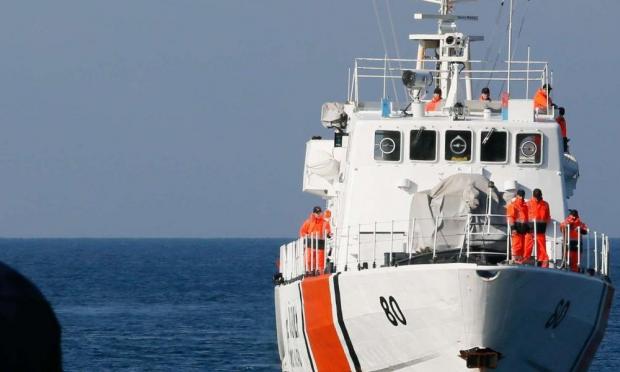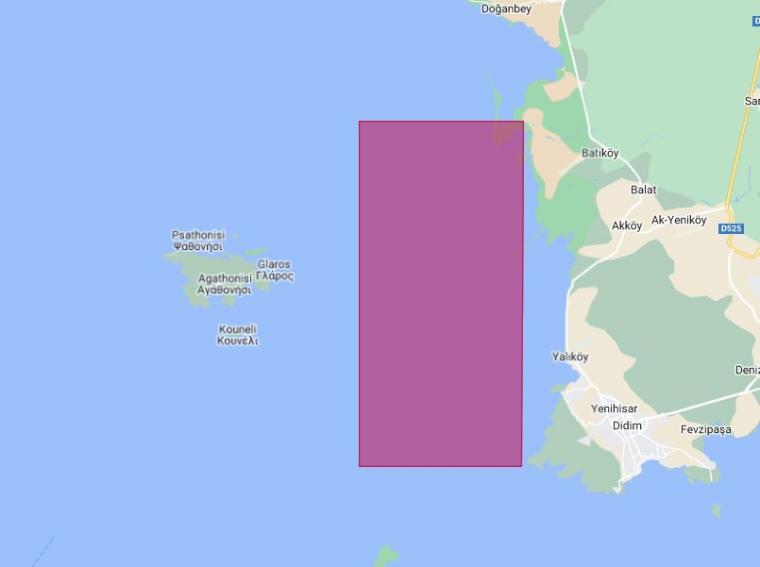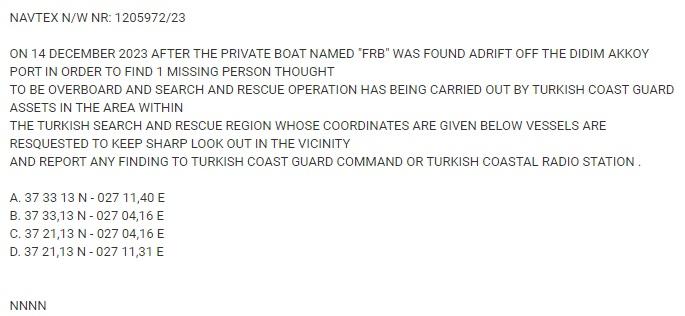Turkey continues to challenge the Greek jurisdiction and in the part of the reservation of areas for Search and Rescue operations, as beyond Casus Beli and the Blue Homeland, its aim is to wrest control of these operations east of the 25th meridian from Greece.
On Thursday Ankara issued NAVTEX 1205972/23 for a Search and Rescue operation for a person presumed missing as according to the Turkish directive to mariners he must have fallen from the private FRB vessel.
However, Turkey, acting as if it has jurisdiction for SAR operations up to the 25th meridian, blocked an area of which a significant part to the west is within Greek jurisdiction.
At the same time, Ankara, probably wanting to test the Greek reflexes or in response to the "Minos 2023" exercise conducted by the Greek Navy and the Coast Guard in the Aegean, Ionian and Eastern Mediterranean with the cooperation of commercial and fishing vessels over 300 knots from December 13th until today, proceeded to blockade areas near its shores from today until the 19th of the month.
The fact is as far as SAR operations are concerned, the Foreign Ministry said that search and rescue for air accidents is governed by Annex 12 of the 1944 Chicago Convention and the ICAO Rules and Recommendations. The Greek area of responsibility for search and rescue in cases of air accidents has been defined by a periodic air navigation agreement within the framework of an ICAO Conference in 1952 and coincides with the Athens FIR.
As far as search and rescue in cases of maritime accidents is concerned, Greece has been coordinating these operations within the Athens FIR since its creation in the 1950s. Greece's assumption of responsibilities for maritime search and rescue within the Athens FIR reflects the geographical reality in the region, given the scattered Greek islands in the Aegean Sea, which allow for the most immediate, rapid and effective, from an operational point of view, provision of services for the protection of human life at sea. Moreover, this is also in line with the relevant IMO and ICAO recommendations on the need for Search and Rescue areas, both for air and maritime accidents, to coincide with the boundaries of FIRs.
Greece declared in 1975 its area of responsibility for maritime search and rescue to the Intergovernmental Maritime Consultative Organisation (IMCO), the predecessor of the International Maritime Organisation (IMO). Furthermore, both at the time of signing and ratifying the Hamburg Convention of 1979, which regulates maritime search and rescue issues and was adopted within the IMO, Greece declared that its area of responsibility coincides with the Athens FIR, a statement which was included in the law by which the said International Convention was incorporated into the Greek legal order in 1989 (Law 1844/1989).
It is noted that the Hamburg Convention provides that the areas of responsibility of the Contracting Parties for the provision of search and rescue services in the event of maritime accidents shall be determined by agreement between the coastal States concerned. In this context, Greece has signed agreements on cooperation in maritime search and rescue matters with Italy (2000), Malta (2008) and Cyprus (2014), which explicitly state that the Greek area of responsibility coincides with the Athens FIR, while similar agreements are pending with other neighbouring states.
Nevertheless, in 1988, Turkey issued Regulation 1988/13559 (as amended by Regulation 2001/3275), by which it defined as its area of responsibility for the provision of search and rescue services, without specifying whether it concerns maritime or air accidents, an area which, in addition to the FIRs of Istanbul and Ankara, includes part of the Athens FIR up to about the middle of the Aegean Sea, trapping a large part of Greek territory within the Turkish search and rescue area. In October 2020, Turkey with its newest Regulation (3095/2020), which explicitly refers to search and rescue for accidents involving both maritime and air assets, extended its area of responsibility for search and rescue in the Mediterranean - within the Athens FIR - westwards to the 26th meridian, touching the external territorial waters of the eastern coast of Crete, occupying an even larger part of Greek territory. e.g. the islands of Kasos and Karpathos) and the Greek search and rescue area.
This Turkish action, i.e. the inclusion of Greek islands, Greek territorial waters and Greek airspace in the Turkish search and rescue area, clearly violates the sovereignty of Greece and the relevant international conventions.
And the inclusion of part of the Athens FIR in the Turkish area of responsibility, apart from lacking operational effectiveness, violates Greek competences assigned by ICAO.
It also contradicts general international practice, as well as the recommendations of IMO and ICAO, contained in the International Aeronautical and Maritime Search and Rescue Manual (IAMSAR Manual), which advocate the adoption of identical areas for the provision of search and rescue services in maritime and air accidents. Similarly, Annex 12 to the Chicago Convention recommends that search and rescue areas should coincide with the boundaries of FIRs.
It is clear from the above that any Turkish objections in this regard serve specific political purposes that have nothing to do with humanitarian search and rescue operations. And the more recent (October 2020) expansion of the Turkish search and rescue area in the Eastern Mediterranean, so that it coincides with the boundaries of the new expansive Turkish narrative of the "Blue Homeland", demonstrates that Turkey is using search and rescue as another vehicle to promote its revisionist and expansionist ambitions in maritime zones beyond any concept of international law.
In any case, it is noted that in practice, Greece, through the competent Greek Joint Rescue Coordination Center (JRCC) in Piraeus, effectively coordinates all search and rescue operations, providing services to all ships and planes in distress within the Greek area of responsibility.







